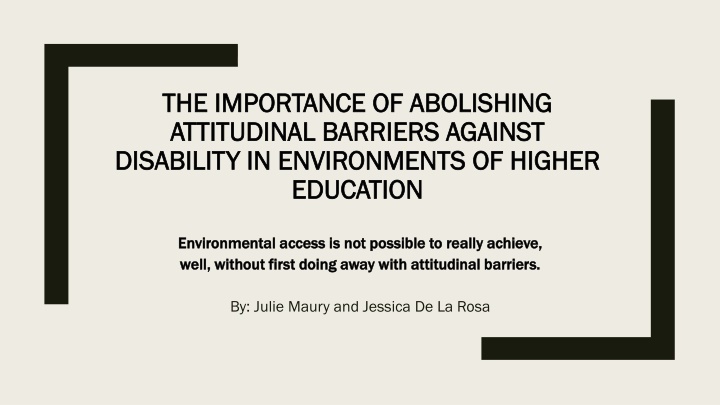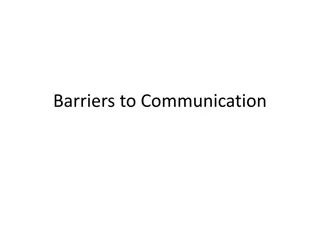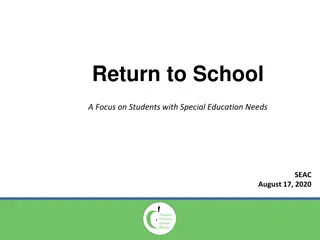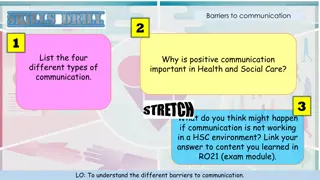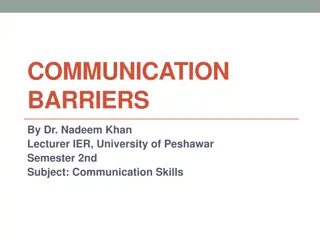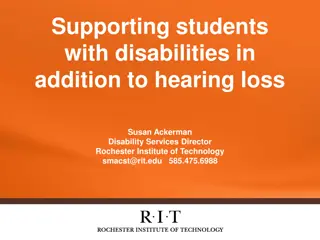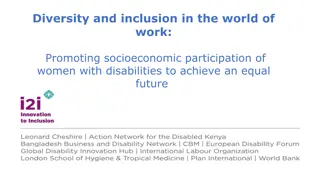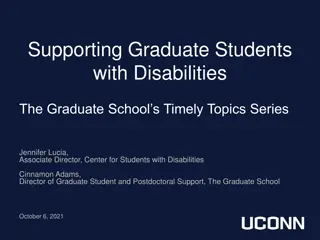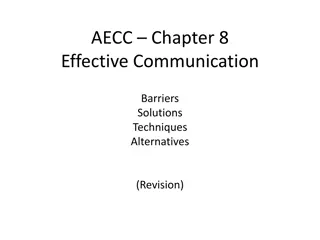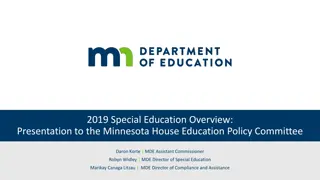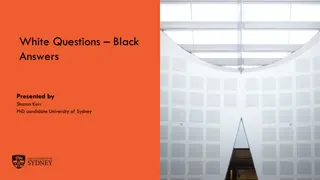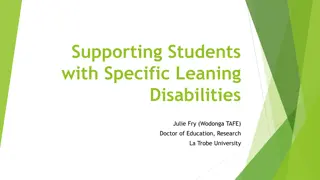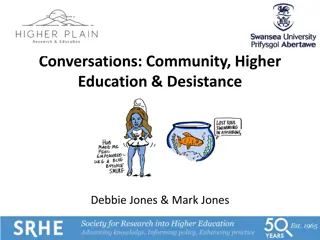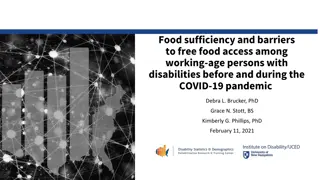Overcoming Attitudinal Barriers for Students with Disabilities in Higher Education
Achieving environmental access in higher education environments for students with disabilities requires abolishing attitudinal barriers first. Positive faculty attitudes have been shown to enhance academic success for these students, combating stigma and societal disadvantages associated with disability. Addressing negative faculty attitudes is crucial for creating inclusive and supportive learning environments.
Download Presentation

Please find below an Image/Link to download the presentation.
The content on the website is provided AS IS for your information and personal use only. It may not be sold, licensed, or shared on other websites without obtaining consent from the author.If you encounter any issues during the download, it is possible that the publisher has removed the file from their server.
You are allowed to download the files provided on this website for personal or commercial use, subject to the condition that they are used lawfully. All files are the property of their respective owners.
The content on the website is provided AS IS for your information and personal use only. It may not be sold, licensed, or shared on other websites without obtaining consent from the author.
E N D
Presentation Transcript
THE THE IMPORTANCE OF ABOLISHING IMPORTANCE OF ABOLISHING ATTITUDINAL ATTITUDINAL BARRIERS AGAINST BARRIERS AGAINST DISABILITY IN ENVIRONMENTS DISABILITY IN ENVIRONMENTS OF HIGHER EDUCATION EDUCATION OF HIGHER Environmental access is not possible to really achieve, Environmental access is not possible to really achieve, well, without first doing away with attitudinal barriers. well, without first doing away with attitudinal barriers. By: Julie Maury and Jessica De La Rosa
About Julie and Jessica: Julie: I am a Disability Studies Scholar. I was a Disabled In Action Board Member. I worked in an "Independent Living Center" as an information and referral specialist. Currently working on advocacy around disability issues. Jessica: I'm involved in adaptive sports. I am Ms. Wheelchair New York 2016. I am a college graduate of John Jay who specialized in Security Management. I am currently working on raising awareness around the rights of children with disabilities in schools.
What Evidence Is There, If Any, That Faculty What Evidence Is There, If Any, That Faculty Attitudes Actually Increase The Academic Attitudes Actually Increase The Academic Success of Students With Disabilities? Success of Students With Disabilities? There is evidence which demonstrates that positive faculty attitudes, There is evidence which demonstrates that positive faculty attitudes, towards students with disabilities, actually does increase the academic towards students with disabilities, actually does increase the academic success of students with disabilities. success of students with disabilities. It is important to first understand that students with disabilities can It is important to first understand that students with disabilities can encounter hardships in academic settings, as within general areas of life. encounter hardships in academic settings, as within general areas of life. This can result from an attitude of stigma from the majority of able This can result from an attitude of stigma from the majority of able- -bodied society towards disability. society towards disability. The Journal of Medical Humanities The Journal of Medical Humanities it was stated that: [The term], it was stated that: [The term], impairment gained a fairly secure foothold [in society] for describing the impairment gained a fairly secure foothold [in society] for describing the divergence of certain bodies from their normal functioning, and disability divergence of certain bodies from their normal functioning, and disability became exclusively a term to describe the social disadvantage to became exclusively a term to describe the social disadvantage to which...society [sees] impairment (Hirschmann, Nancy, J., 2013). These which...society [sees] impairment (Hirschmann, Nancy, J., 2013). These words demonstrate the negative connotations around divergent bodies. words demonstrate the negative connotations around divergent bodies. bodied
Some Negative Faculty Attitudes Towards Some Negative Faculty Attitudes Towards Students with Disabilities are Based in Students with Disabilities are Based in Unawareness: Unawareness: It has been confirmed that some Professors of students with disabilities, in settings It has been confirmed that some Professors of students with disabilities, in settings of Higher Education can hold a lack of proper knowledge around the issues of of Higher Education can hold a lack of proper knowledge around the issues of students with disabilities. In one qualitative research study, titled: students with disabilities. In one qualitative research study, titled: The Chilly Climate for Students with Disabilities in Higher Education for Students with Disabilities in Higher Education it was stated, in part, that: There is...evidence that faculty seem uninformed about the nature of disability, oblivious to is...evidence that faculty seem uninformed about the nature of disability, oblivious to the needs of students with disabilities, or generally lacking in terms of understanding the needs of students with disabilities, or generally lacking in terms of understanding what it means to have a disability. what it means to have a disability. In fact, along with some students' general lack of preparedness for college and the In fact, along with some students' general lack of preparedness for college and the absence of comprehensive support programs, negative attitudes of faculty are cited absence of comprehensive support programs, negative attitudes of faculty are cited as a as a primary primary reason that students with disabilities fail at the postsecondary level." reason that students with disabilities fail at the postsecondary level." The Chilly Climate it was stated, in part, that: There Source: Source: Beilke, J. R., & Yssel, N. (1999). T Beilke, J. R., & Yssel, N. (1999). The ChillyClimate for Students with Disabilities he ChillyClimate for Students with Disabilities in Higher Education in Higher Education. . College Student Journal College Student Journal, , 33 33(3), 364. (3), 364.
There Is Great Value In Not Assuming There Is Great Value In Not Assuming One's Needs...Just Ask... One's Needs...Just Ask... There was a qualitative study done about returning to college There was a qualitative study done about returning to college after having a Spinal Cord Injury resulting in paralysis. Three after having a Spinal Cord Injury resulting in paralysis. Three subjects, with spinal cord injuries, in this study that appeared in subjects, with spinal cord injuries, in this study that appeared in an issue of The American Journal of Occupational Therapy an issue of The American Journal of Occupational Therapy reported, on page 310, that: ...although they each had the reported, on page 310, that: ...although they each had the capability of pushing their own wheelchairs, teachers...often capability of pushing their own wheelchairs, teachers...often assumed they could not and therefore did it for them. [This assumed they could not and therefore did it for them. [This resulted in] feelings of loss of control and loss of dignity [for resulted in] feelings of loss of control and loss of dignity [for these three study subjects]. If a student, disabled or not, feels these three study subjects]. If a student, disabled or not, feels like they have been infantilized by faculty, this may not bode well like they have been infantilized by faculty, this may not bode well for a students' future possibilities of academic success. for a students' future possibilities of academic success.
Faculty With Previous Positive Exposure to Faculty With Previous Positive Exposure to Disabilities Tend to React More Positively... Disabilities Tend to React More Positively... For example, in a Journal of Postsecondary Education and Disability For example, in a Journal of Postsecondary Education and Disability article it was stated, in part: Faculty who had a student or a friend with a psychiatric disability stated, in part: Faculty who had a student or a friend with a psychiatric disability had more positive perceptions of working with students with psychiatric disabilities had more positive perceptions of working with students with psychiatric disabilities than faculty who did not have one of these experiences (Brockelman, K. F., 2011. than faculty who did not have one of these experiences (Brockelman, K. F., 2011. Pg. 47). This quote shows people something important Pg. 47). This quote shows people something important- -exposure to difference can help break down stigma around it. Also, this holds true for disabilities in general, not help break down stigma around it. Also, this holds true for disabilities in general, not just those with mental health disabilities. just those with mental health disabilities. article it was exposure to difference can Discomfort and fear of working with students who have mental illnesses were Discomfort and fear of working with students who have mental illnesses were associated with making fewer accommodations and referrals (Brockelman, K. F., associated with making fewer accommodations and referrals (Brockelman, K. F., 2011. Pg. 44). Fewer (or no) accommodations have been noted to have a direct 2011. Pg. 44). Fewer (or no) accommodations have been noted to have a direct effect on a students academic success: Providing reasonable accommodations effect on a students academic success: Providing reasonable accommodations significantly increases the probability of success for [disabled]...students (Skinner, significantly increases the probability of success for [disabled]...students (Skinner, Michael E., 2007. Pg. 1). Michael E., 2007. Pg. 1).
Developing A Wide Variety of Friends and Colleagues is Important... Developing Friendships Can Help Combat Stigma... Photo Description: Six children and a Teacher sit around a table, in a classroom, working on a project. One of those children is in a wheelchair.
Faculty Attitudes, Towards Their Students' With Faculty Attitudes, Towards Their Students' With Disabilities Can And Do Influence The Outcome Of Said Disabilities Can And Do Influence The Outcome Of Said Students' Level Of Academic Achievement: Students' Level Of Academic Achievement: Faculty attitudes towards disability can vary: Faculty attitudes can Faculty attitudes towards disability can vary: Faculty attitudes can range from viewing the student s accommodation request as: an range from viewing the student s accommodation request as: an unfair advantage, something given only out of obligation, encouraged, unfair advantage, something given only out of obligation, encouraged, or a right. Faculty attitudes can hinder, encourage, or enhance the or a right. Faculty attitudes can hinder, encourage, or enhance the student s attempts to have appropriate accommodations student s attempts to have appropriate accommodations implemented. The greater the communication between students with implemented. The greater the communication between students with disabilities and faculty administration and the clearer the disabilities and faculty administration and the clearer the understanding of the nature of disability by all concerned, the more understanding of the nature of disability by all concerned, the more likely it will be that students with disabilities can maximize their likely it will be that students with disabilities can maximize their educational potential and with ease (Graham, S. and English, R., educational potential and with ease (Graham, S. and English, R., 2001, Pg. 1). Those quoted sentences let people know, and help 2001, Pg. 1). Those quoted sentences let people know, and help reiterate to them, that faculty attitudes towards disability can and do reiterate to them, that faculty attitudes towards disability can and do differ and can be influential to students with disabilities. differ and can be influential to students with disabilities.
Positive Relationships In Academia Matter: Don't Fear Asking Questions... Photo Description: A person in a wheelchair has their back facing the camera. This person is raising their hand. A woman Teacher stands in front of him and behind her there is a board with red letters. She smiles at him.
Effective Communication is a Key To Effective Communication is a Key To Success: Success: An example of that is in An example of that is in The Journal of Deaf Studies and Deaf Education The Journal of Deaf Studies and Deaf Education that stated, in part, the following about students who are Deaf and their ability to stated, in part, the following about students who are Deaf and their ability to achieve academic success: Success of deaf students in mainstream achieve academic success: Success of deaf students in mainstream discourse situations is...highly dependent on their commitment to effective discourse situations is...highly dependent on their commitment to effective communication as well as the commitment of instructors and hearing peers communication as well as the commitment of instructors and hearing peers (Lang, H. G., 2002. Page 275). This quote shows Readers that when students (Lang, H. G., 2002. Page 275). This quote shows Readers that when students who are Deaf participate in discussions, within mainstream classrooms, their who are Deaf participate in discussions, within mainstream classrooms, their positive academic performance is correlated to good communication. The positive academic performance is correlated to good communication. The communication must be effective from the students end of the conversation communication must be effective from the students end of the conversation but also from the faculty members end as well. It stands to reason that lack of but also from the faculty members end as well. It stands to reason that lack of sign language ability, from the faculty member, would constitute a barrier in sign language ability, from the faculty member, would constitute a barrier in communication if that is the only way a Deaf student can communicate. communication if that is the only way a Deaf student can communicate. that
Students With Disabilities Should Be Students With Disabilities Should Be Taught Self Taught Self- -Advocacy Skills: Advocacy Skills: A book called: Preparing Students with Disabilities for College Success: A Practical A book called: Preparing Students with Disabilities for College Success: A Practical Guide to Transition Planning Guide to Transition Planning by a Mr. Stan F. Shaw, Joseph W. Madaus, and Lyman L. by a Mr. Stan F. Shaw, Joseph W. Madaus, and Lyman L. Dukes, III states that: ...students with disabilities must be ready to immediately be Dukes, III states that: ...students with disabilities must be ready to immediately be active participants in the accommodations process (Shaw, et., al. P. 59). It should active participants in the accommodations process (Shaw, et., al. P. 59). It should be made clear that, although, positive faculty attitudes, towards students with be made clear that, although, positive faculty attitudes, towards students with disabilities do seem to correlate with increased academic achievement of those disabilities do seem to correlate with increased academic achievement of those students students self self- -advocacy (of/by the students) plays an important role too. It is always advocacy (of/by the students) plays an important role too. It is always important for students, with and without, disabilities to advocate for their own needs important for students, with and without, disabilities to advocate for their own needs as to make their needs known. Otherwise, if a need for accommodation is not clearly as to make their needs known. Otherwise, if a need for accommodation is not clearly stated to faculty, outright, it therefore cannot be assessed and resolved. stated to faculty, outright, it therefore cannot be assessed and resolved.
Mentors Are Important: Mentors Are Important: Three Friends: Photo Description: Three women in wheelchairs sit in front of a pastry stand, in a diner, with smiles on their faces looking at the camera. The woman in the middle has her arms around the girls to her side. The three women in the photos, from left to right, are Julie, Nadina, and Jessica.
Solutions: Solutions: Address issues/concerns directly and in a timely manner. Do not assume what is possible. Always ask what is possible for a student to achieve. Honor reasonable accommodations requests. It is better to not put your own judgements on them. Encourage students to self advocate for what they need by giving them support to do so. Learn about the value of the school's Student Support Services. Engage in an active awareness about Disability Studies and Culture. Look up books, films, etc. Dealing with Disability Studies and Culture. Consider mandatory awareness/sensitivity trainings for school staff around disability issues. Make that a routine part of the school year.
